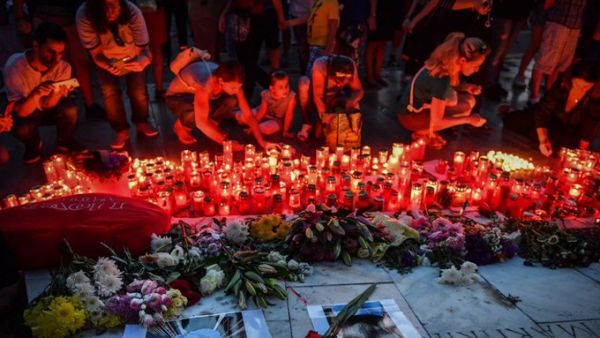The abduction of a Romanian schoolgirl who is feared dead has sparked furious protests against the government after police took 19 hours to respond to her cry for help.
Alexandra Macesanu, 15, rang European emergency number 112 to say she had been snatched by a man while hitchhiking to her home village from the nearby southern town of Caracal.
After authorities finally located the premises where the girl had been dragged to, they found what appeared to be human remains and traces of her jewellery.
The painfully slow response time has whipped up locals into disgust and yesterday saw 2,000 Romanians demonstrate on the streets of Bucharest.
They stormed through the capital in the evening waving banners reading 'corruption kills,' 'their blood is on your hands' and 'Romania is being killed.'
At the end of the march, a vigil was held for Alexandra where protesters laid flowers and candles outside the interior ministry.
{"preview_thumbnail":"https://cdn.flowplayer.com/6684a05f-6468-4ecd-87d5-a748773282a3/i/v-i-a…","video_id":"a1816d00-3fdf-45f2-a0ca-2687f0727645","player_id":"8ca46225-42a2-4245-9c20-7850ae937431","provider":"flowplayer","video":"King Abdullah, Abu Dhabi Crown Prince Reaffirm Jordan UAE Relations"}
Organisers said in a statement the protest was 'against the indifference of those in power, their incompetence and lack of empathy.'
Police suspect the remains they found belong to Alexandra and to an 18-year-old girl from a nearby village who was reported missing in April, but forensics analysts have yet to confirm their identity.
On Saturday, suspect Gheorghe Dinca, a 65-year-old mechanic, was detained for 30 days pending a criminal investigation.
Romania's police chief and two county officials were fired late on Friday. On Saturday, Prime Minister Viorica Dancila said she was considering calling a referendum to introduce harsher sentences for rapists, pedophiles and murderers.
Since taking power in late 2016, Dancila's ruling Social Democrats have changed judicial legislation via government emergency decrees or through parliament without much public debate, chipping away at judicial independence and prompting criticism from the European Union and diplomats.
Amendments to judicial legislation and pending changes to the criminal code 'have favoured people convicted for corruption,' a professional association of judges said in a statement on Saturday.
The changes 'weakened rule of law by depriving criminal investigators of the technical and legal instruments essential for their job, endangering the lives and safety of all Romanians,' they added.
This article has been adapted from its original source.








